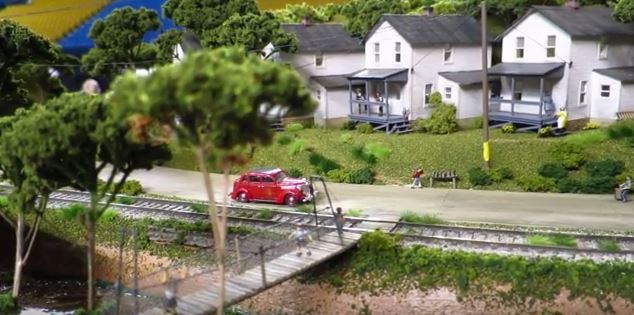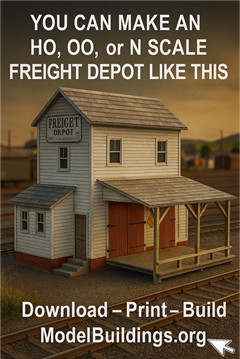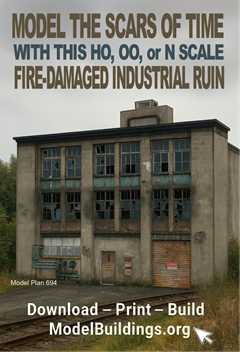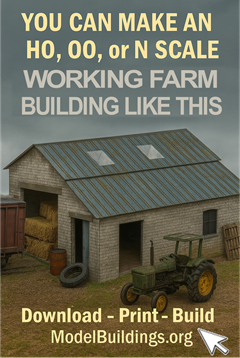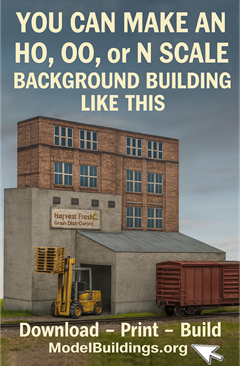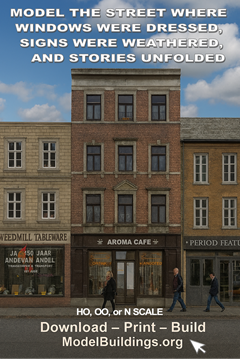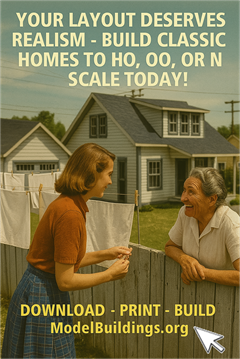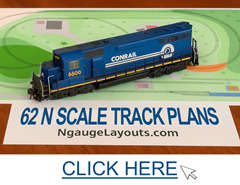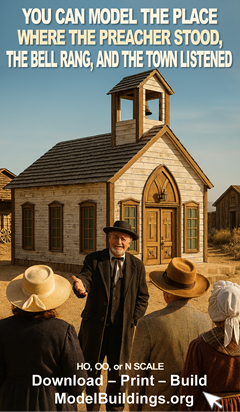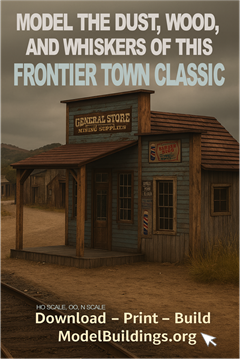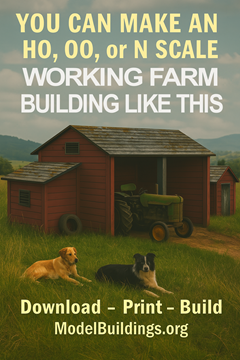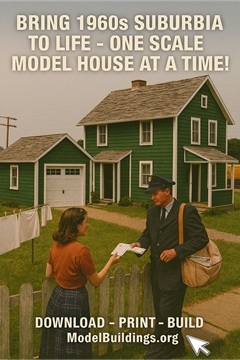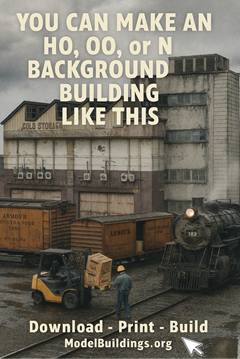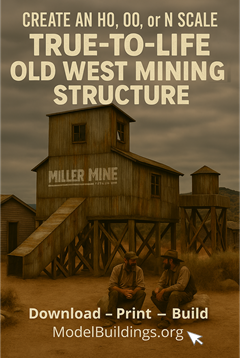Everything on model trains, model railroads, model railways, locomotives, model train layouts, scenery, wiring, DCC and more. Enjoy the world's best hobby... model railroading!
Turnout Placement Tips for Reliable and Realistic Model Railroad Trackwork
When planning a model railroad layout, turnout location plays a major role in how smoothly your trains run and how realistic your trackwork looks. Poorly placed turnouts can lead to derailments, awkward train movements, and track that simply doesn’t look right. Taking the time to plan ahead will save frustration later.
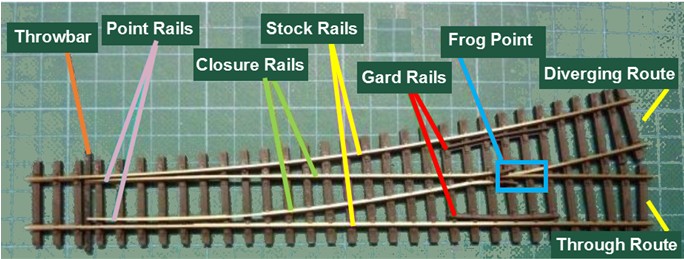
Before laying any track, sketch your full track plan on paper or using layout design software. Clearly mark where each turnout will go and how it connects to both straight and curved track sections. This makes it easier to check alignment and avoid last-minute adjustments that can compromise reliability.
Whenever possible, place your mainline on the straight leg of a turnout, just as real railroads do. Running mainline traffic through the curved leg increases side forces on wheels and couplers, which can cause problems… especially with longer rolling stock. Keeping the mainline straight through turnouts improves both operation and appearance.
Be especially careful to avoid tight S-curves created by turnouts placed too close together or connected directly to opposing curves. Adding short straight sections between curves helps trains transition smoothly and reduces derailments.
Also consider turnout length. Larger, longer turnouts may require extra space but provide gentler curves and better performance. Finally, don’t forget the space needed beneath or beside the turnout for switch machines or manual throw mechanisms. Planning for these details early ensures smooth, dependable operation and a layout that looks right from every angle.
How Steep Should You Make Your Model Train Track? A Guide to Avoiding Derailments, Motor Burnout, and Traction Issues
One of the most common questions among model railroad enthusiasts is: How steep should I make the slope of my track? This concern usually stems from potential issues like derailments, motor burnout, and poor wheel traction. To help you strike the perfect balance between functionality and performance, let’s break down the key factors involved in determining the ideal track gradient.

The 3% Rule of Thumb
As a general rule, you should aim for no more than a 3% slope. This means for every 100 inches of track, you would have a 3-inch rise in elevation. At this slope, you are unlikely to encounter significant issues, such as derailments or overloading the motor.

To put it into perspective, a 3% grade translates to a rise of approximately 3/4 inch for every 2 feet of track. If you can maintain this grade, your trains should run smoothly under typical conditions.
Can You Go Steeper?
If you’re running shorter trains, you might be able to push the grade slightly steeper without causing issues. However, there’s a trade-off. The steeper the slope, the harder the locomotive has to work to pull the train, which can result in motor burnout. Traction tires can help with this, allowing you to tackle steeper grades with longer trains. But, be mindful that the motor still has to work harder, and overloading it could lead to premature failure.
Shorter Grades for Shorter Runs
Another option is to use shorter grades. In cases where only part of the train is on the incline at any given time, you can increase the grade slightly. For example, if you’re planning a short climb, the entire length of the train may never be affected by the steep slope. This can provide a more forgiving experience, as the locomotive won’t have to work as hard over longer distances.
The Best Approach: Gentle Slopes
If you want your trains to run with minimal issues and the longest possible run, it’s always best to opt for the most gradual incline possible. Keeping the grade gentle reduces the strain on your motor, ensures better wheel traction, and generally improves the reliability of your layout.
A Note on Curves
If the incline also includes a curve, it’s essential to make the grade even less steep. Curves add additional drag to the train, and a steeper grade on a curve can increase the chances of derailments and motor strain. To prevent these problems, keep your curves as gentle as possible when adding elevation changes.
Conclusion
In summary, when designing your model train layout, a 3% slope is generally the sweet spot. It offers a good balance between performance and motor safety. If you’re planning to go steeper, ensure you’re running shorter trains or using traction tires to help with traction. And remember, when your track includes curves, reduce the grade to minimize drag and prevent derailments. By keeping these factors in mind, you can enjoy smooth, reliable train operation while avoiding common problems like motor burnout or derailments.
Grab a Bargain on these Model Train E-books – Available now at the lowest prices ever offered!

The BEGINNERS BLUEPRINT Model Railroading PDF e-book series is your ultimate guide to building a model railroad, whether you’re just starting out or looking to improve your skills. Here’s what you’ll find in this comprehensive 6-part series:
- Planning Basics
Learn the fundamentals of model railroading with this e-book. It explains key terms like scales and gauges, helps you avoid common planning mistakes, and shows you how to start small and expand as you gain experience. You’ll also get an overview of DC vs. DCC power systems and a step-by-step guide to planning your ideal layout. - Track & Benchwork Basics
This guide covers everything from choosing the right track to building solid benchwork. Learn how to create modular layouts, prevent common track-laying mistakes, and get tips on ballasting, working out gradients, and wiring your layout with easy-to-follow diagrams. - Scenery Basics
Master the art of creating realistic scenery, including trees, roads, tunnels, and more. With clear instructions and visuals, this e-book makes it easy to craft detailed backdrops, weathered buildings, and stunning landscapes. - DCC Basics
DCC (Digital Command Control) doesn’t have to be intimidating. This e-book explains how to get started with DCC systems, covering everything from wiring to throttle control, with diagrams to guide you. - Troubleshooting
When something goes wrong, this guide helps you quickly identify and fix problems—saving you time and frustration. - 138 Questions & Answers
This handy reference is packed with expert solutions to common problems, helping you resolve issues quickly and efficiently.
Each downloadable e-book is simple to understand, with step-by-step instructions and helpful visuals. Save time, money, and frustration with these proven techniques!
Railroad Inventory Data
Nelson writes:
“My daughter suggested an Excel Spreadsheet as the best way to keep a record of my trains: model type and number, date purchased, working condition, wheels, length, DCC, maintenance history, purchase price etc. She has offered to set it up for me and teach me how to use the software. It could be handy, but will the effort outweigh the benefit? What have others found? Thank you in advance.”
Mastering Realistic Layouts: How to Use Colors and Textures for Authenticity in Model Making
Colors and Textures: The Key to Realistic Layouts
When it comes to creating a realistic model layout, colors and textures play an essential role in bringing your scene to life. Realism is all about mimicking the colors and textures of the real world. By paying close attention to these details, you can add depth and authenticity to your creations.
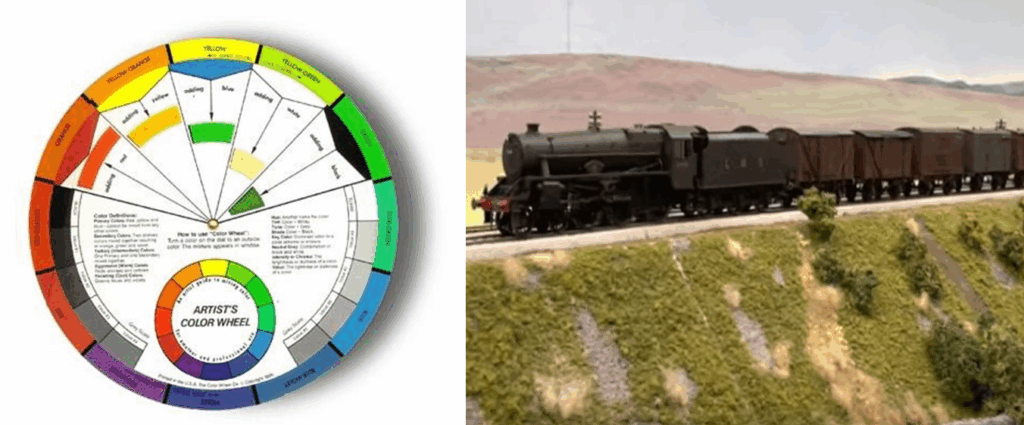
By thoughtfully applying colors and textures, you’ll create layouts that feel authentic, whether you’re building a rustic landscape, a city scene, or a wintry wonderland.
Acrylic paints are your best friend in this process. These water-based paints are not only easy to work with but can also be thinned to the perfect consistency for different techniques. The added bonus? Cleaning up is a breeze. Unlike oil paints that require solvents like mineral turpentine, acrylics can be cleaned with plain water, making them much more convenient for brush and airbrush users.
To achieve a truly natural look, experiment with various colors and textures. Play around with different patterns and arrangements to simulate real-world wear and tear, such as weathering effects. This helps make your layout feel like it’s been through the test of time.
When selecting colors, aim for natural hues that reflect real-world environments. Greens, browns, and grays should be your primary palette, as these shades are commonly found in nature. If you’re working on a winter scene, white can be added for snow effects. White also works well as a base for mixing lighter shades, which is helpful for creating highlights and softer transitions.
Bachmann EMD E7 Vs Proto 2000 E7
Steve asks:
“How does an HO Bachmann EMD E7 compare with a Proto 2000 E7 – reliability, faults, shell detailing, etc?”
You can post your comments below.
Transform Your Scenery: Using Color and Texture for Hyper-Realistic Model Railroads
Creating a layout that feels like a real miniature world—rather than a toy train set—often comes down to two essential ingredients: color and texture. These elements shape how the eye interprets a scene, and when used well, they can completely change the atmosphere and realism of your railroad..
Whether you’re building rolling hills, desert plains, industrial grime, or lush forest, mastering colors and textures is one of the easiest ways to elevate your layout from “nice” to “wow!”
6 Ways to Use Color & Texture for More Natural, Realistic Scenery
1. Break Free From “One-Green-Fits-All”
Real landscapes come in dozens of greens… yours should too.
One of the quickest giveaways of an unrealistic layout is using the same green everywhere. Nature simply doesn’t do that. Grass near a ditch looks different from sun-bleached grass near a road. Young shrubs are bright, fresh green, while older growth looks deeper and more muted.
Try blending a variety of shades:
- olive and sage greens
- brown-green mixes
- fresh yellow-greens
- darker forest greens
Sprinkling in touches of tan or brown also gives the illusion of patchy, irregular growth. The result? A landscape that feels alive instead of plastic.
2. Build Up Texture in Layers
Flat surfaces scream “fake.” Layering creates depth.
In the real world, nothing is perfectly smooth… not fields, not dirt roads, not forest floors. To recreate that natural roughness, build your scenery using layers of texture.
Start with:
- a dirt-colored base coat
- a thin layer of fine ground foam
Then add: - static grass
- coarse scatter
- small stones
- weeds, tufts, bushes, sticks
Every pass adds more dimension. Layer by layer, your flat plywood turns into terrain with contour, depth, and life.
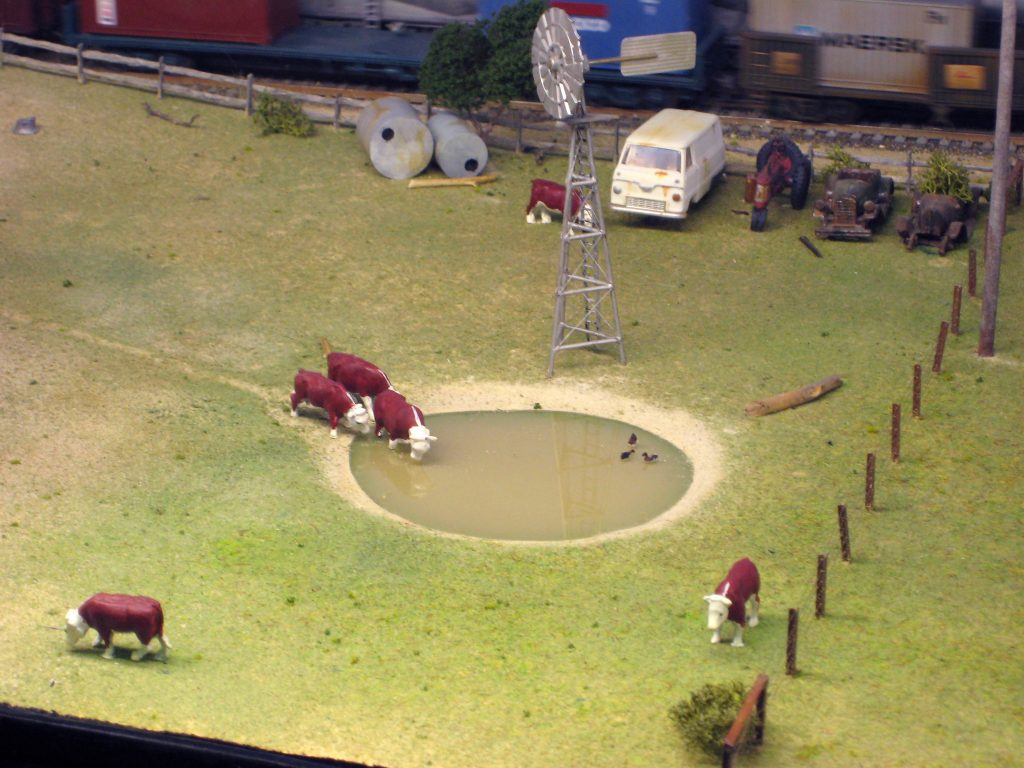
? Download the latest Model Buildings catalog FREE here:
https://www.modelbuildings.org ?
3. Weather More Than Just Your Rolling Stock
Everything ages… make sure your scenery does too.
Weathering isn’t limited to locomotives and freight cars. Trackside structures, roads, bridges, and even the ground around them all show signs of age.
A few ideas:
- Faded paint on buildings
- Mossy green tints near wet areas
- Dusty, darkened paths where foot traffic occurs
- Oil streaks around engine facilities
- Rust stains below metal fittings
A little grime goes a long way. When everything blends with age, the whole scene becomes more cohesive and convincing.
4. Stick With Earthy, Natural Color Palettes
Bright colors should be accents, not the backdrop.
Real terrain rarely features bright, saturated color. Instead, it’s dominated by earth tones… soft browns, sandy tans, muted greens, stone grays.
Use these tones as your foundation. Then add brighter pops of color only where needed:
- signage
- flowers
- vehicle lights
- clothing on figures
When flashy colors are used thoughtfully, they draw attention without overwhelming the scene.
5. Match Textures to the Terrain You’re Creating
Different environments need different materials.
Not all textures are interchangeable. Gravel should look like gravel. Dirt roads should feel dusty and worn. Rocky cuts should feel sharp and irregular.
Try these texturing ideas:
- Fine sandpaper makes convincing compacted dirt
- Sifted real soil glued down looks great in rural areas
- Bark chips or crushed leaves work for forest floors
- Carved foam, plaster, or small real stones create crags and cliffs
When each type of terrain has its own distinct surface, the viewer’s eye recognizes it immediately… boosting realism without explanation.
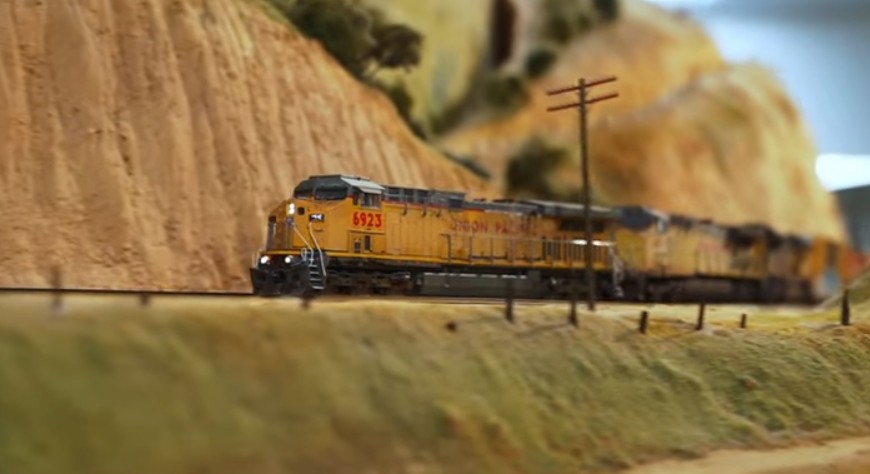
6. Learn From the Real Outdoors
Nature is the best reference guide you’ll ever have.
One of the simplest ways to improve your scenery is to observe the real thing. Spend a few minutes photographing roadside grass, the color of gravel, or the way dirt collects at the base of fences.
Look closely at:
- how many browns are in a patch of earth
- how shadows change color perception
- how messy, uneven, and imperfect everything is
You’ll start noticing details you never thought to include before, and those details will set your layout apart.
Create Scenes That Feel Alive
Your model railroad doesn’t need to be flawless to be believable… it just needs to capture the essence of the real world. With thoughtful use of color variation, textured layering, and a bit of natural inspiration, you can create scenery that feels rich, organic, and truly immersive. Let your imagination and the real outdoors guide you, and watch your miniature world come alive.
Identifying A Cracked Gear
Don models HO and asks:
“My GP9 has started to make a funny noise. Could this be the telltale signs of a broken or crack gear?”
If you would like to add suggestions, you can do so using the “COMMENTS” link blow.
Getting S Curves Right for Smooth Model Train Running
Let’s chat about S curves… those graceful back-and-forth bends that make a model railroad look alive and dynamic. They add flow, variety, and a natural look to your scenery. But while they’re beautiful to watch, S curves can quietly become one of the biggest trouble spots on a layout if they’re not designed with care.
Many modelers (me included) have discovered the hard way that poorly planned S curves can mean derailments, wobbly couplers, and general frustration. The secret isn’t avoiding them altogether… it’s understanding how to design them so they run smoothly and reliably.
What Is an S Curve, Exactly?
An S curve happens whenever the track curves one direction and then immediately swings the opposite way. Picture the shape of the letter “S.” You’ll find them in scenic areas, industrial sidings, and yard ladders… basically anywhere the track changes direction quickly.
The problem shows up when longer cars or locomotives enter the curve. That quick change in direction forces the couplers to twist in opposite ways, putting a lot of sideways pressure on both trucks.
Why They Can Be Tricky
A single curve is no problem; every car just follows the same arc. But when a left-hand curve rolls straight into a right-hand one, the cars at the joint are pulling against each other. The longer the cars, the more severe the stress. That’s why modern passenger cars and long freight stock are most likely to misbehave on tight S curves. Short 40-foot boxcars and switchers tend to glide through with much less drama.
Add a Straight in Between
One of the simplest fixes is to insert a short straight section between the two opposing curves. Even a single car length of straight track can “reset” the couplers, letting everything line up again before hitting the next bend. Without that straight, you create what’s known as a pinch point… and that’s where derailments and uncoupling love to happen.
Go Big When You Can
Radius size makes a huge difference. Tight curves magnify every flaw, while broad curves let trains flow naturally. In HO scale, for example, 24-inch curves handle long cars far better than 18-inch ones. If you’ve got the room, always go wider… especially where two curves meet.
Check Turnouts and Yards
S curves often sneak into yard ladders or crossover areas. Placing two turnouts back-to-back without any straight in between creates the same side-to-side tension as a regular S curve. Adding even half a car length of straight track can dramatically improve reliability.
Five Handy Tips
- Use broad curves wherever space allows
- Insert a straight between opposing bends
- Avoid S curves directly after switches
- Test with your longest cars before finalizing
- Slow down through tight trackwork
Handled thoughtfully, S curves look amazing and run smoothly. A little extra planning now means fewer derailments later… and trains that glide through those bends just the way they should.
Keep Your Trains on Track: Why Model Train Derailments Happen (and How to Stop Them)
Few things are more frustrating for a model railroader than watching a beautifully detailed train take a nosedive off the track. Whether it’s one stubborn car that always jumps the rails or an entire consist that suddenly derails, the result is the same… damaged stock, chipped scenery, and a few choice words muttered under your breath.
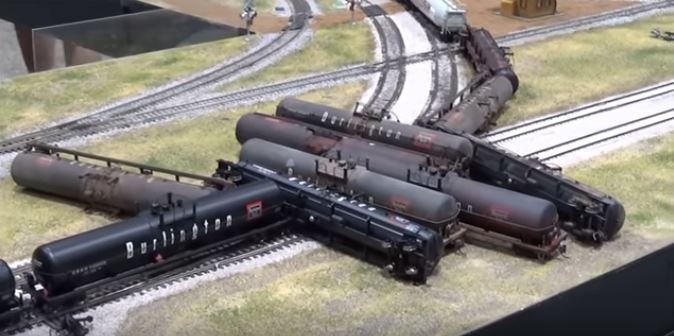
Derailments can be caused by anything from a dirty wheel to a misaligned turnout, and figuring out the culprit can feel like detective work. Sometimes the problem is limited to one tricky spot on the layout. Other times, derailments happen all over, pointing to issues with the locomotive or rolling stock – things like wheel alignment, trucks, couplers, or even uneven weighting.
If derailments keep happening in the same place, though, it’s a pretty good sign there’s a local track issue… a kink in a rail join, a warped section of track, a misaligned switch, or a slope that’s just a bit too steep.
Luckily, most derailments are easy to fix once you know what to look for. Here are some common causes, and how to keep your trains running smoothly.
Tips to Prevent Model Train Derailments
- Keep your track and rolling stock clean.
Dust, grime, and oxidation can build up fast and cause wheels to lift or slip. Regular cleaning keeps everything running silky smooth. - Clean your electrical connections and controls.
Poor conductivity can make trains jerk or stall, which sometimes leads to derailments. - Do regular preventative maintenance.
A few minutes of upkeep now saves hours of troubleshooting later. - Lubricate wheels and couplers… but sparingly.
A dry coupler can snag or jerk; too much oil attracts dust and can damage paintwork. Less is more! - Check the weight of your cars and wagons.
Cars that are too light can bounce or tilt on curves, especially tight ones. - Add a little extra weight when needed.
Just a few extra grams, placed low and centered, can improve traction and balance dramatically. - Aim for a low center of gravity.
Weight added near the base of a car helps it hug the rails and glide through curves without wobbling.
No one wants a train wreck on their layout, and with a bit of care and maintenance, you can keep derailments to a minimum. A clean track, well-balanced cars, and smooth couplers mean your trains will stay right where they belong — on the rails, running beautifully every time
Why OO Scale Is So Popular – And Where It Really Shines
If you’ve ever browsed model railway forums or wandered through a UK hobby shop, you’ve probably noticed how dominant OO scale is in Britain. It’s practically the national standard … and for good reason.

OO scale runs at a ratio of 1:76, which makes it slightly larger than HO scale (1:87), even though both use the same track gauge of 16.5mm. That’s where things get interesting. Technically, OO scale trains are a bit oversized for the track they run on, but most British modellers are happy to overlook that in favor of the extra detail and presence OO offers. It’s a bit like choosing a slightly larger canvas… you get more room to play with textures, weathering, and character.
Compared to N scale (1:160), OO feels positively grand. N scale is brilliant for compact layouts and long scenic runs, but it can be fiddly for those of us who like to get hands-on with detailing. OO hits a sweet spot: big enough to show off rivets and rust streaks, small enough to fit a satisfying layout in a spare room or shed.
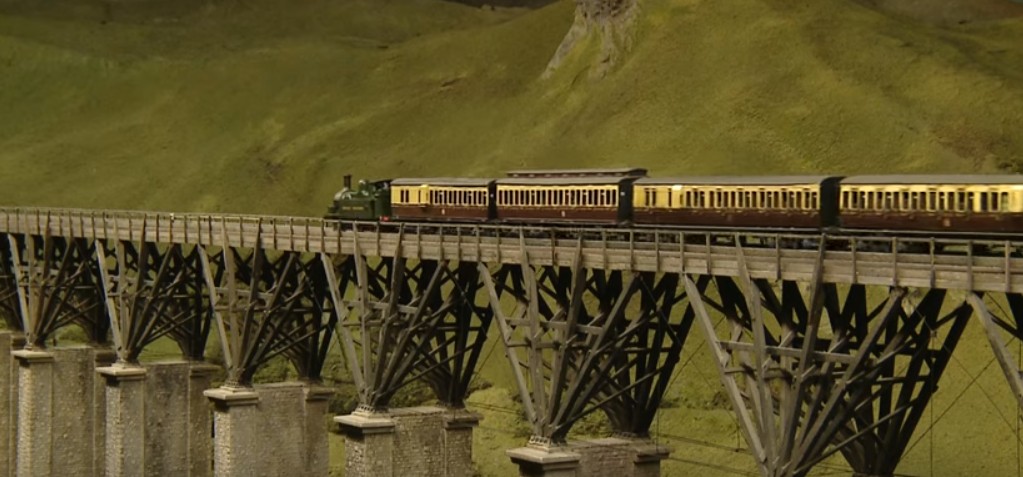
Now, where is OO scale most popular? The UK is its heartland, no doubt. Most British manufacturers… Hornby, Bachmann Branchline, Dapol… focus heavily on OO. You’ll also find pockets of OO enthusiasts in Australia and New Zealand, especially among those who grew up with Hornby sets or have a fondness for British rail history. It’s less common in North America, where HO and N dominate, but there’s still a niche following.
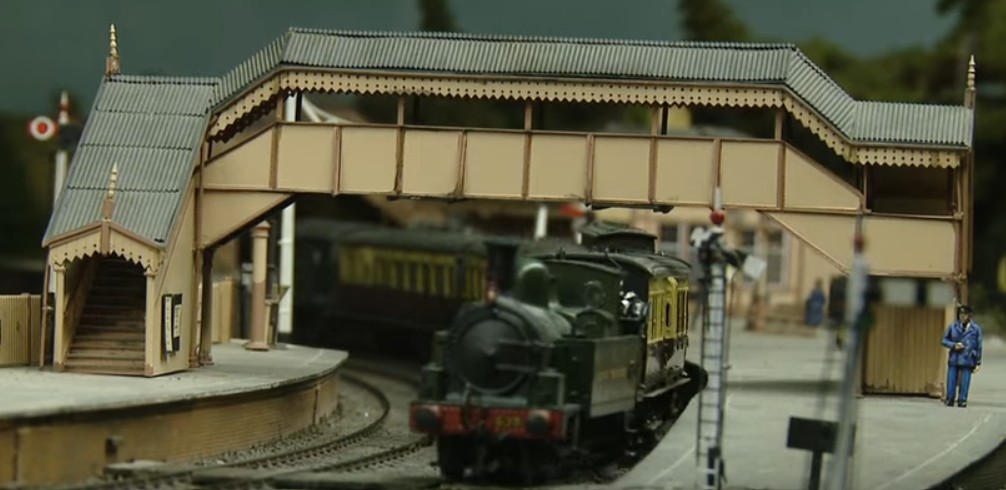
Some famous OO scale layouts are absolute jaw-droppers. Take Pendon Museum in Oxfordshire… their Vale Scene is a masterclass in rural realism, with buildings modeled from actual villages and trains running through a landscape that looks like it was plucked from the 1930s. Then there’s Great Model Railway Challenge on British TV, where teams build OO layouts under pressure… it’s a fun watch and shows just how versatile the scale can be.
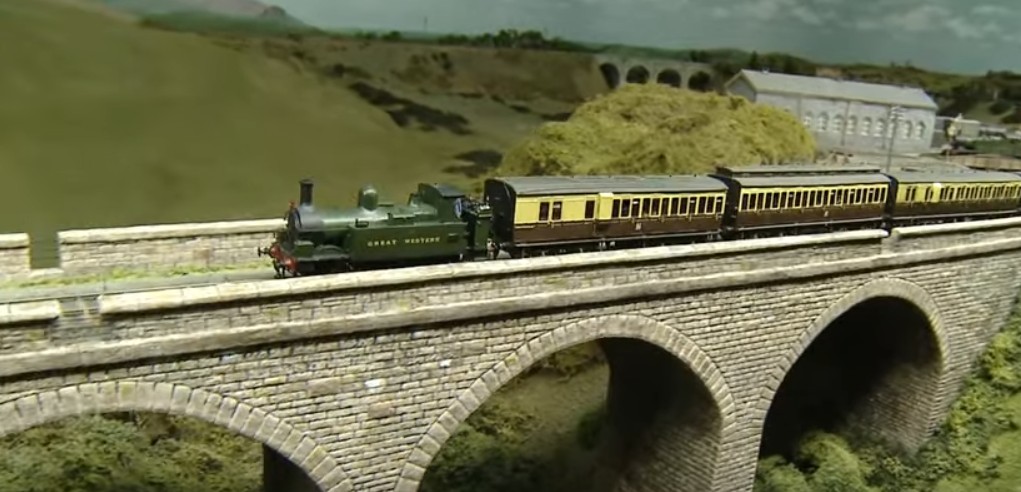
In short, OO scale is a bit of a British quirk that’s grown into a beloved standard. If you’re drawn to character-rich locomotives, charming countryside scenes, and a scale that balances detail with practicality, OO might be your perfect fit. And hey… if you’ve got a layout in OO, HO, or N, I’d love to see it. There’s always something new to learn from how others bring their miniature worlds to life.
Add Drama to Your Layout: Creating a Fire or Emergency Scene
If you’re looking to inject some real-life excitement into your model railroad, why not add a little drama – a fire or emergency scene? It’s one of those touches that instantly draws attention, tells a story, and brings your miniature world to life. Whether it’s a small car fire beside the highway or a full-on house blaze with firefighters in action, an emergency scene adds movement, color, and realism that can make your layout unforgettable.
Why It Works
Model railroads aren’t just about trains. They’re miniature worlds full of human activity. A well-placed emergency scene breaks up the calm of everyday scenery and tells viewers that something’s happening. It gives people a reason to stop, look closer, and imagine the story behind it. It’s the kind of detail that makes visitors point and say, “Wow, look at that!”
Scene Ideas to Try
Start small if you’re new to this. A single car accident with a police cruiser and flashing lights can look great along a highway section. If you want to go big, create a house or warehouse fire scene. Use LED flicker lights to simulate flames inside windows, and orange or red lighting beneath cotton “smoke” for an impressive glowing effect.
WATCH THE VIDEO to see how to create this burnt-out house model
https://www.modelbuildings.org/fire-department-ambulance-police-station-models
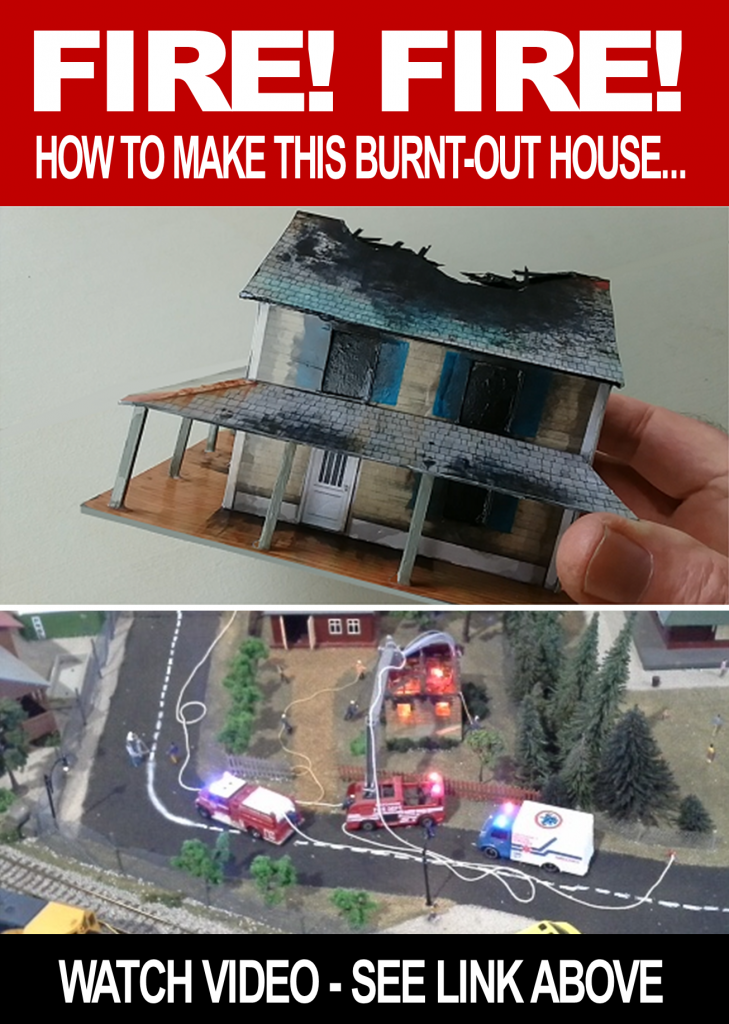
Add firefighters in action – some holding hoses, others climbing ladders, and maybe one or two handling equipment near a pumper truck. Use fine wire or thread to represent water hoses stretched across the street, and scatter a few figures of curious bystanders or reporters nearby to create that “on the scene” atmosphere.
For extra realism, include utility workers blocking traffic, an ambulance standing by, and a police officer redirecting vehicles. If you’re modeling a city scene, a fire truck racing through an intersection with flashing lights will always grab attention.
Make a Fire Station Background building, and burnt-out 3-level city building here
https://www.modelbuildings.org/city-series
Tips for Realism
Lighting is key. Use small pre-wired LED lights or a flashing light circuit to create the look of emergency beacons. A soft flicker circuit behind a building window can mimic the flickering light of flames. Smoke effects are optional, but cotton or polyester fiber teased out and lightly airbrushed with gray or black looks surprisingly convincing.
Don’t forget sound – some hobby sound modules can add a short siren or crowd murmur to boost immersion. Just keep it subtle; you don’t want it to overpower the trains themselves.
Old western style Fire House building to make here
https://www.modelbuildings.org/scale-models-old-wild-west-gold-mining-town
Also, think about the story. Maybe a freight car carrying chemicals derailed near town, sparking a fire. Or perhaps a small rural barn blaze has drawn volunteers from a nearby firehouse. Little storytelling touches like that make your layout feel alive.
The Big Benefit
A fire or emergency scene doesn’t just add interest- it adds emotion. It creates contrast, action, and a sense of realism. Visitors remember layouts that tell stories, not just ones that run smoothly. And for photographers, these scenes make fantastic focal points that highlight both your modeling skills and imagination.
So go ahead, light up your layout (safely, of course!) and give your miniature town something to talk about. After all, what’s a city without a little excitement?
Broken Coupler Issue
Jonathan asks readers:
I have an N scale KATO PA1 with a broken coupler on the rear truck. I can’t find a blow-up diagram on how to remove that coupler and replace it with the appropriate Microtrains coupler. If you have one and can share it, that would be wonderful.
Post any comments below.
Kato Coupling Problems
Eddie asks:
“I’ve got several Kato cars that are causing no end of trouble to couple and uncouple. Admittedly they are N scale so are small and fiddly. Removing them from the track is the easiest way to uncouple them, but putting them back on the track when coupled is tricky. I see there are several brands online… if I replace my Kato couplers which brand would work best?”
To assist Eddie please share your suggestions and comments under this post.
Build Smart: Why Modular Model Train Layouts Might Be Your Best Move
Build Smart: Why Modular Model Train Layouts Might Be Your Best Move
If you love model trains but don’t have the space, time, or patience for a massive, permanent layout, a modular approach might be the perfect solution. Modular train layouts are built in sections, which means you can create your railroad empire one piece at a time, and rearrange it whenever inspiration strikes.
They’re flexible, portable, and easier to manage than a full-size build. But they also come with a few quirks that can trip you up if you’re not prepared. So, let’s look at the pros and cons, followed by the 7 biggest mistakes to avoid (some of which I’ve made myself).
Why Go Modular?
1. Flexibility
This is the number one reason hobbyists go modular. Each module is like its own mini-layout, so you can experiment freely. Want a mountain next to a city yard? Easy. You can swap sections or expand your layout whenever you like.
2. Portability
Moving house or attending a show? No problem. Modular layouts are designed to come apart and travel easily. That’s a major plus if you don’t want your spouse glaring at a ten-foot freight yard taking over the living room!
3. Manageable Workload
Building in sections makes the process less overwhelming. You can focus on detailing one part, learn as you go, and celebrate small victories along the way.
4. Easier Repairs and Upgrades
If something breaks, you don’t need to dismantle your entire railroad. Just remove the affected module, work on it at your bench, and pop it back in place.
A Few Downsides
Connection Challenges – Getting track joints perfectly aligned between modules can be tricky. Even a millimeter off and you’ll have derailments galore.
Storage Needs – You still have to store the unused sections, and some modules can be bulkier than you expect.
Uniformity Limits – If you plan to connect with others at clubs or shows, you’ll need to follow their standards for height, track position, and wiring.
7 Big Mistakes to Avoid When Building Modular Train Layouts
- Not Planning for Interconnection – Always plan how your modules connect: track alignment, wiring, and scenery transitions.
- Ignoring Standards – If you ever plan to exhibit, follow club specs or your module might not fit.
- Making Modules Too Big or Heavy – Stick to 2–4 feet in length for easy handling.
- Skipping Test Fits – Always test alignment before gluing or screwing parts permanently.
- Overcomplicating the Wiring – Keep wiring neat, labeled, and standardized.
- Weak Framing – Each module should be rigid and well-braced to prevent flexing or warping.
- No Transport Protection – Add handles, protect scenery, and use transport boxes if you’ll move them often.
Smart, Flexible Model Train Modular Layouts
Modular model railroading is a smart, flexible way to enjoy the hobby without the stress of committing to one giant layout. It’s easier to move, upgrade, and store… and it keeps the fun alive as you grow your railroad over time.
Just plan ahead, stay organized, and avoid those common mistakes. You’ll have a layout that’s not only fun to build but easy to take wherever your hobby takes you.
? Download your free Model Builders Catalog today: https://www.modelbuildings.org
Great Getting Started in N SCALE Resource
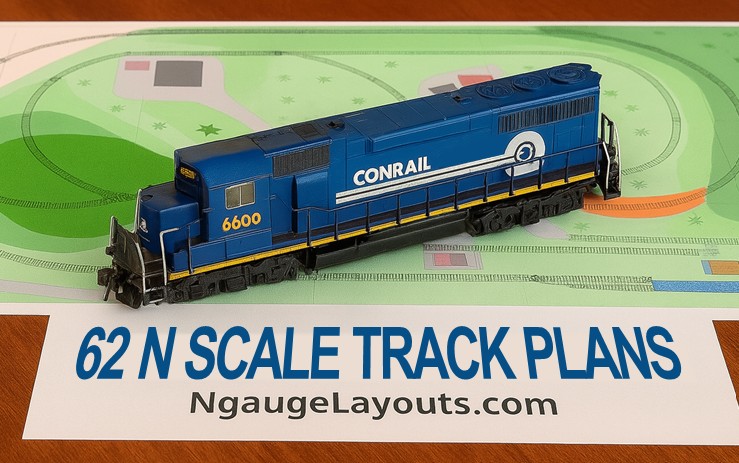
Choose from 62 N SCALE TRACK PLANS to suit any space from 3ft x 2ft table tops, 4ft x 2ft module designs, through to truly inspiring room-sized layouts! And, you can easily adapt any of the plans around your favorite railroad theme.
See more https://ngaugelayouts.com

